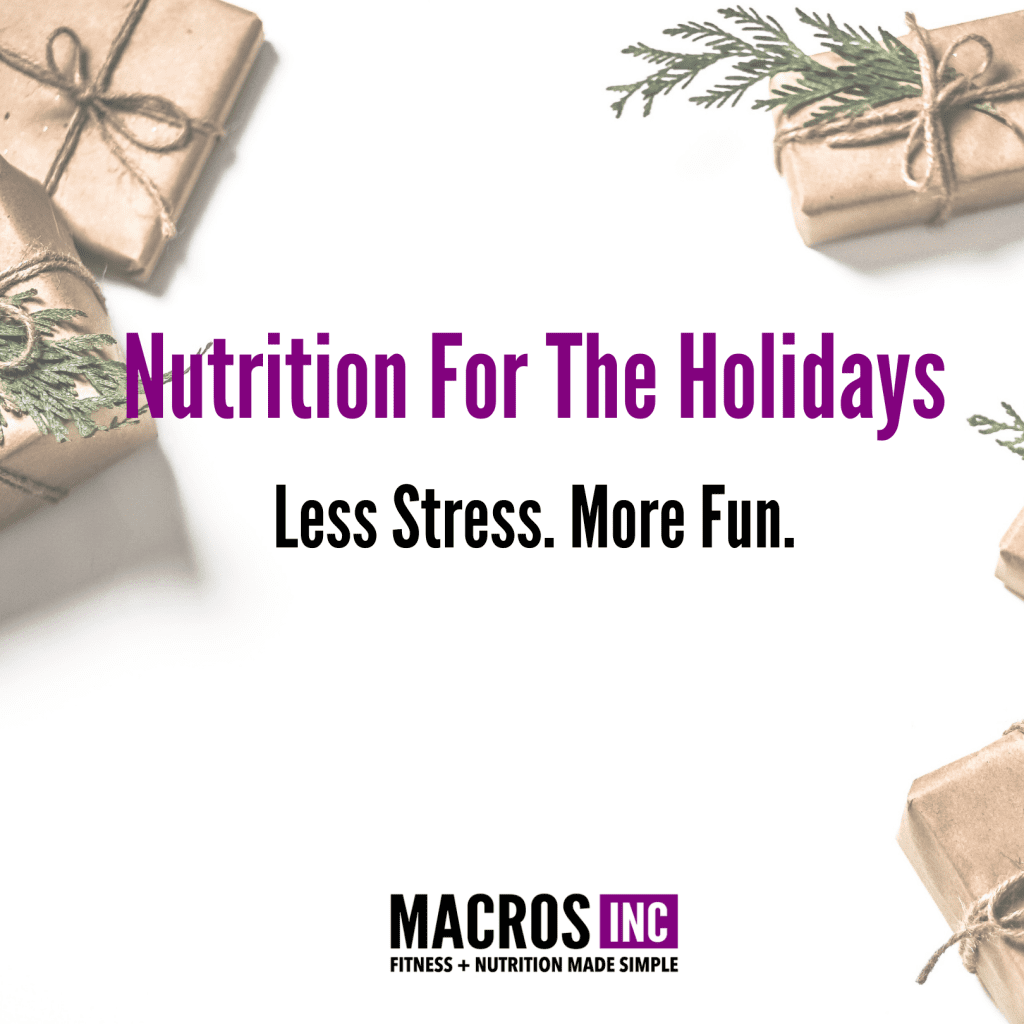The weeks leading up to the holidays can often be a mental challenge for individuals who are looking to improve their health and fitness, especially when it comes to nutrition for the holidays.
There is often anxiety around holiday meals, parties, events, and travel. Higher calorie foods, alcohol, and lack of a consistent training schedule can often set people off course, which causes a lot of stress and uncertainty.
Here at Macros Inc our entire philosophy is based around “Fitness + Nutrition Made Simple” and empowering people to remove stress, fear, and anxiety around food, so let’s take that approach to holiday weight gain.
Jump to a Topic
It isn’t really that bad… but it does matter.
We often think that the holidays cause us to gain a lot of weight. It is often said that people can gain 10-15 pounds around the holidays. But the truth is FAR from that. In reality, most studies show that the true weight gain that occurs during the holiday season is ~1 pound.
No, seriously. 1 pound.
That is it.
But that doesn’t mean nutrition for the holidays isn’t important or something to pay attention to as this 1 pound of gain usually doesn’t end up going away in the following months, which is why people steadily gain weight over the course of years or decades, and not just one 4 week span. In fact, the average weight gain per year as an adult between the ages of 25-60 maps almost perfectly onto holiday weight gain with ~0.75 pounds per year.
This means that the holiday weight problem in one sense is not a major issue, you are trying to avoid 1 pound, not 15. But in another sense, it is a smoldering problem, wherein if you never give it any thought, over the course of a few years or decades it begins to matter.
Know yourself
Nutritional habits are highly personal and we can’t make blanket advice on how to handle a food situation that applies effectively to every single person.
For example, some individuals excel at moderation. They can have one bite of something they enjoy without it spiraling out of control into eating the entire treat table. For others, they do much better at avoiding treats as they know that their ability to control food behaviors are much more difficult once you start.
Do some self-exploration in the weeks leading up to holiday events to find what strategies work best in controlled environments like dinners or meals at home.
This might look like avoiding foods that you find you can’t control portion sizes on. It may be choosing to limit the amount of food you put on your plate or skipping appetizers. You can work through different options to see what works best for you as an individual.
Limit the alcohol
I’m sorry to be the no-fun police. I generally tend to have a more laissez faire attitude about things, but alcohol is one of those areas where you really need to reign it in.
There are two reasons to limit alcohol:
- You end up drinking a lot of empty calories, especially if they are mixed drinks (there are almost 800 calories in a long island iced tea).
- Your decision making around food and your ability to self-manage hunger is dramatically impaired when drinking, often leading to very large calorie surpluses.
If you are going to drink, limit it to a couple drinks and try and keep them lower-calorie, simple drinks.
Don’t sweat a meal or two, sweat a month or two
One of the most important things to remember to help you “destress” your holidays and how you think about nutrition for the holidays is that the calories you consume in 2-3 meals will not be what derails your progress.
In fact, even if you overeat by 1000 calories at two meals, after your body handles the excess calories you are going to gain less than half a pound, which is pretty minimal in the context of your life.
This also has the implication that if you decide to NOT track a couple holiday meals, it is not the end of the world. You can enjoy the meal without much stress and just get back on the plan the next day without any real, lasting negative impact on your progress or your goals.
It is personal, but don’t make it personal if you don’t want to
Food is a very personal thing. There are emotions attached to it, cultural meaning, and for some people making food for their family is their love language.
This is normal. It is ok to have a personal connection with food around the holidays. But it is also okay to not make it personal if you need to.
If someone gives you a plate of holiday treats as a gift, you can accept it and not eat it and make it available to the rest of your family.
You can also tell them that you appreciate the gift and know how important it is to them, but for right now you are minimizing consuming those foods because it doesn’t align with your own personal mission.
The Wrap Up
The nutrition for the holidays can be stressful for many people, which is totally understandable. But, you can destress it by taking a few key principles with you as you approach family meals, holiday parties, and other shenanigans this holiday season.
Try our nutrition coaching, for free!
Be the next success story. Over 30,000 have trusted Macros Inc to transform their health.
Simply fill out the form below to start your 14-day risk-free journey. Let's achieve your goals together!

